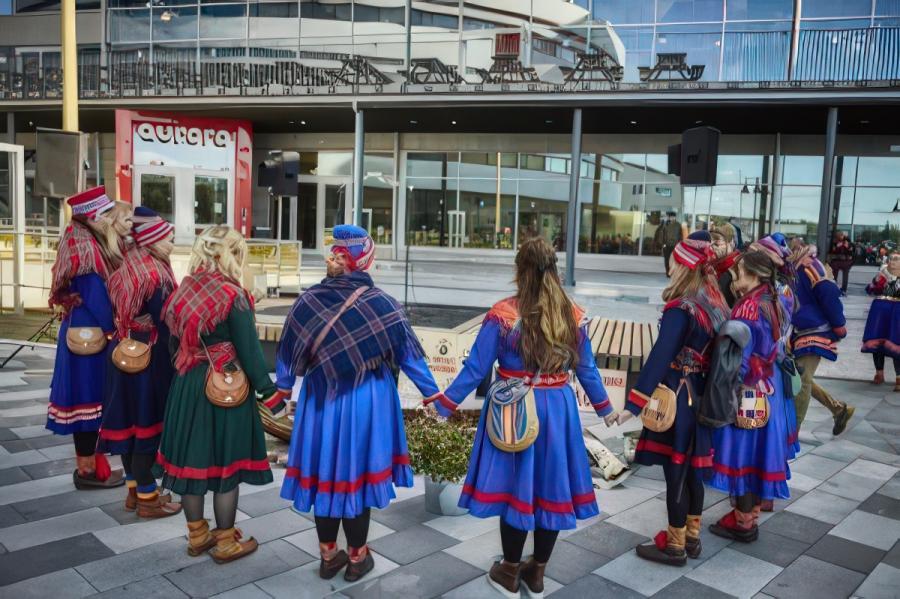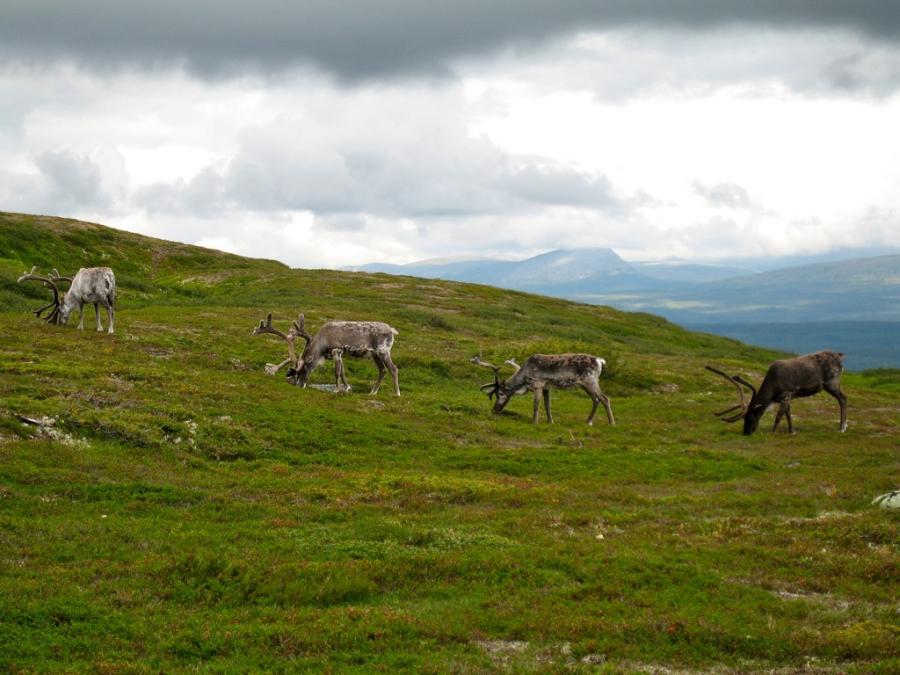In Saami Land, Women Are Encouraged to Become Lawyers— But Many Would Rather Be Reindeer Herders
I have been a member of the Swedish Saami Parliament since 2001. I am from the southern Saami area and from a traditional reindeer herding family. My father herds reindeer and I have a few of my own, but my father cares for them because I am too busy with my other work. Only a minority of the Saami people are reindeer herders now, but it is the traditional living of the Saami.
Today reindeer herding has become modernized and male-dominated. Traditionally, of course, the whole family was engaged in herding. The women may have done more as far as preparing the reindeer meat or making handicrafts from the pelts, antlers, and bones, but they were still out in the field close to the reindeer. Today it is hard for a family to survive on reindeer herding only.
Many women must work a regular job in addition to herding, and it’s the men who are mostly out in the field. For women who really want to become reindeer herders, it’s harder because the attitude is that they should go to school and become a teacher or a lawyer or some other profession. When a family has both boys and girls, the boys tend to take over the herding.
It is interesting that women are welcomed into politics but are discouraged from reindeer herding. Men always say that it is more difficult to be a reindeer herder because you need to be strong, you need to be able to drive a snowmobile, which is heavy, and if you get stuck somewhere, you need to be able to handle it yourself. There’s an attitude that women can do politics, because that’s not hard, but they are too weak to be reindeer herders.
I think people are starting to realize that by not allowing women to herd, we are losing a lot of our traditional culture. The men are realizing that we cannot get the children involved in herding unless the whole family is engaged in it. If only one person in the family herds, it takes a lot of time and they do not have time to sit down and do the traditional handicrafts.
Last year, the Swedish Saami Parliament designated four members to develop a gender equality program. The Saami Parliament is a part of the Swedish government. It is responsible for certain aspects of governing the Saami community, and it also represents the Saami community in government. We are supposed to put pressure on the Swedish state, but we don’t actually have much say in government decisions. We can only make suggestions, and we only have 31 members to pressure the Swedish state to change the system. We are struggling all the time to get more power, and to do that we need to establish a common politic for the Saami people. Therefore, it is important for us to develop programs, like what we are working on for gender equality, so that we know what kind of Saami society we want.
One of the suggestions that has been made by those of us working on the gender equality program is to allocate money for programs that will allow the reindeer-herding communities to write their own gender equality plans. If a community wants to apply for money to initiate a program, they will be asked to present their plan to the parliament. That way there will be pressure on the communities to take the initiative.
The Saami Parliament also plans to encourage women to become reindeer herders, but we have not yet figured out how we will do this. One possibility may be to send letters to girls in the reindeer-herding communities.
The situation of the indigenous women in different countries depends a lot on the situation of women as a whole in these countries. Sweden is often said to be the most equal country for women in the world. In many ways it’s true—Sweden has come far. There is an equal number of men and women in the Swedish Parliament, and the women are taken seriously. But the majority of the Saami Parliament is still men, so Saami women have a harder time being heard in decision-making processes.
As with all peoples, there are problems among the Saami with violence against women. The Saami Parliament in Sweden is only 10 years old, and we have spent these years dealing with questions that unite the Saami as a group, such as rights to land and to our language. We do not know much about the prevalence of violence against women in our society. We need to have more research about that, and our gender equality program will hopefully be able to tackle this issue.
As a woman, I have been welcomed into the Saami Parliament. I was encouraged to enter because they needed members who are younger. I think the politicians really appreciate and understand that there is a problem with how few women are engaged in the decision-making. But, on the other hand, if I had children, I think it would be difficult to be in politics because the society around me would not be prepared to take care of my kids. And the men around me think that raising the children is not their responsibility. This challenge is even greater for women who are reindeer herders.
The Saami Parliament arliament has agreed to adopt the gender equality program that our committee has written. One program goal is that women will have equal representation in the parliament by 2009. We also want more women acting as spokespersons for reindeer-herding communities. Currently, out of 51 herding communities, only two have women leaders. At the same time, we want to have more men working as teachers and in other positions that today are female-dominated.
Our work has just started and the priority now is to have women elected to at least 30 percent of the parliament seats in next May’s election. That campaign is coming soon.


